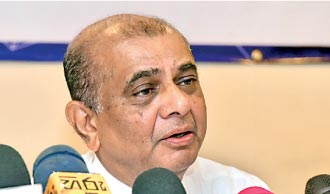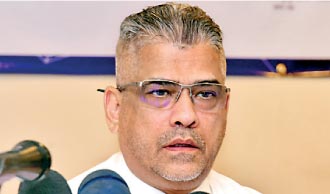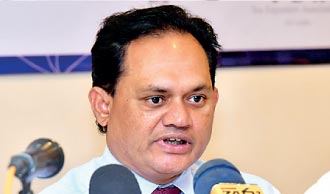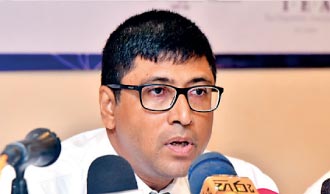Sunday Feb 22, 2026
Sunday Feb 22, 2026
Thursday, 9 May 2024 03:37 - - {{hitsCtrl.values.hits}}

Jayantha Karunaratne

Sean Van Dort

Ganesh Deivanayagam

Pushpika Janadheera

Yohan Lawrence

Jehan Perinpanayagam

Ranil Goonetileke
By Charumini de Silva
Several leading export associations on Tuesday made a clarion call for urgent action to revitalise Sri Lanka’s stagnant merchandise exports.
Holding a joint media conference, organised by the National Chamber of Exporters (NCE), Sri Lanka Shippers Council (SLSC), Joint Apparel Association Forum of Sri Lanka (JAAF), Tea Exporters Association (TEA), Sri Lanka Association of Manufacturers and Exporters of Rubber Products (SLAMERP), Expo-rters Association of Sri Lanka (EASL) and Sri Lanka Associ-ation for Software and Services Companies (SLASSCOM), shed light on the intricacies and potential of Sri Lanka’s export landscape. They highlighted a range of challenges including inconsistent policies, inadequate infrastructure, challenges in ease of doing business, bureaucratic hurdles, financial issues and taxation complexities.
It was pointed out that addressing these issues is crucial not only to boost exports but also to drive economic growth and ensure a sustainable future for export-oriented industries. The export community stressed the importance of collaboration between the Government, industry stakeholders and regulatory authorities to effectively navigate these challenges and capitalise on emerging opportunities in the global market.
NCE Chairman Jayantha Karunaratne asserted the need for consistent policies, regulatory transparency and strategic infrastructure investments to boost export growth and economic sustainability.
He underscored the concerning trend of stagnating merchandise exports over the past two decades, juxtaposed with a decline in the export-to-GDP ratio from 39% in 2000 to 22% in recent years. “Inconsistent policies and opaque regulatory frameworks, have undermined investor confidence and hinder long-term planning for businesses,” he added.
Karunaratne also lamented the sluggish pace of foreign direct investment (FDI) inflows into Sri Lanka. “Ease of doing business and regulatory transparency are key factors influencing investor decisions,” he said, urging policymakers to streamline regulations and enhance transparency to foster a conducive business environment.
Karunaratne also stressed the importance of brand protection for Sri Lankan exporters, advocating for swift signing of the Madrid Protocol to safeguard local brands and enhance their competitiveness in global markets.
Noting the lingering impact of the COVID-19 pandemic and subsequent financial strains on exporters, he stressed that many small and medium enterprises continue to grapple with operational challenges and financial constraints.
He called for greater flexibility from commercial banks and urged the Central Bank to reassess recent regulatory measures to alleviate the burden on exporters and facilitate their recovery.
Karunaratne asserted the need for long-term infrastructure investments, particularly in transportation and digitalisation. “Improvements in the railway system are essential to reduce transportation costs and enhance logistics efficiency,” he added.
SLSC Chairman Sean Van Dort highlighted the challenges faced by importers and exporters due to the reluctance to fully embrace digital solutions.
“Sri Lanka is fearful of digitalisation. The border protection agencies and policymakers want to see us face to face — and we all know for what,” he said.
Van Dort expressed concern over the prevailing manual verification processes, which resulted in delays and added costs for businesses noting that digitalisation efforts had shown promise during the COVID-19 pandemic.
“During COVID all our operations worked smoothly as digitalisation was accepted. There were no issues but since things got normalised post-pandemic, they have reverted to checking everything manually,” he said.
He claimed that successive Governments do not have the drive and the vision to completely transform systems into digital. “Pre-COVID, there was no problem with money except for the many bottlenecks created by border protection agencies, putting the fear psychosis into the Government,” he added.
The SLSC Chairman urged the Government to demonstrate a strong political will and commitment to achieving 100% digitalisation, insisting on the need for a paperless environment to boost trade and competitiveness.
“Our manufacturers and exporters are facing stiff competition from global giants. We are losing ground as countries like India and Bangladesh are snatching the market share for many of the commodities we export. The only request for the Government is to ensure speed and trade facilitation,” he added.
He also called for reforms in Customs procedures and border protection agencies to facilitate smoother trade operations. He highlighted the need for a risk assessment program to expedite cargo clearance and reduce bottlenecks at ports.
Addressing concerns over brand protection and cargo handling practices, he stressed the importance of investing in modern infrastructure and equipment to ensure the efficient handling of goods.
He explained the pitiful situation that they have to go through to earn foreign exchange for economic development.
“We have to cow and bow to these officers who don’t give two hoots about what happens to the country but on the input side. We have to change this, but it is painful. People will have to come out of their comfort zones because they are used to getting ‘x amount of happy money’ to give the general services that are expected,” Van Dort claimed.
He said while there is a combination of good, bad and ugly Custom officers, many are ‘bad and ugly’.
On the import side, Van Dort cited the Sri Lanka Ports Authority (SLPA) as another entity involved, where numerous trucks await customs verification particularly on Friday evening, leading to costly delays for Sri Lankan customers.
“The Customs’ ASYCUDA as well as the Risk Program initiatives remain unimplemented for years, due to staff shortage. But digitalisation could address these issues by reallocating resources to bottleneck areas. These slight adjustments could offer Sri Lankan exporters and importers the competitive advantage needed in the global market,” he pointed out.
He called for the eradication of outdated practices that undermine trade efficiency and damage Sri Lanka’s reputation as a reliable trading partner.
“We also have concerns regarding brand protection and distribution channels. Every truck transporting export cargo is stopped by the Sri Lanka Air Force near the airport entrance. While they inspect the cargo, they lack the necessary infrastructure and equipment to unload and inspect it properly. As a result, the cargo is simply tossed onto the ground,” SLSC Chief charged.
TEA Chairman Ganesh Deivanayagam issued a fervent plea to the Government urging reconsideration of policies that could jeopardise the tea export industry.
Highlighting the recent economic strides made by the country, he acknowledged the sacrifices made by citizens and businesses alike to overcome challenges.
However, he cautioned against complacency, insisting on the necessity of aligning policies with the current economic landscape and global trends.
“Exports are the way out of any economic crisis,” he said.
Deivanayagam raised two critical concerns that threaten the tea export industry’s competitiveness. The first issue pertains to the imposition of value-added tax (VAT) on tea, a move that could significantly burden exporters and diminish their ability to compete effectively.
With 87% of tea production exported, he said the imposition of an 18% VAT poses a key challenge, particularly for exporters who must bear the VAT costs upfront.
“Exporters participating in the auctions must pay upfront within five working days to take ownership of the tea they have purchased for export. However, the imposition of an 18% VAT on commodities like tea poses a significant challenge. Exporters are required to fund this 18%, often resorting to borrowing from banks while waiting for VAT refunds,” he explained.
He also expressed scepticism regarding the efficiency of the VAT refund mechanism, citing past delays and inconsistencies in refund disbursements.
“Simplified VAT (SVAT) allows exporters to handle documentation without immediate cash outlay for VAT. But it is set to be removed by March 2025 — a decision, reportedly advised by the IMF. This is concerning, especially for smallholder tea producers who account for 75% of tea production. The VAT imposition could significantly affect our competitiveness in the global market,” he added.
He also said despite VAT refunds being promised, historical performance in terms of timely refunds from the Inland Revenue Department (IRD) has been disappointing.
“We conducted a sample survey among some of our export companies. This sample included 19 companies, revealing VAT dues totaling Rs. 467 million from as far back as 2010. It is concerning that even after 14 years, some refunds from 2021, 2022, and 2019 have yet to be received. This small sample illustrates the challenges faced by exporters, as they anticipate VAT refunds to manage their finances effectively. Exporters often factor in expected VAT refunds when pricing their products competitively. However, if these refunds are delayed or not received at all, exporters may need to reduce prices or compromise competitiveness. Unlike many other countries, Sri Lanka imposes VAT on exports, placing exporters at a disadvantage in global markets,” he lamented.
He pointed out that when exporting to markets where VAT is not levied, Sri Lankan products carry an additional cost burden. “If VAT refunds are not forthcoming, exporters may struggle to maintain prices, impacting not only their profitability but also the livelihoods of tea smallholders who rely on stable prices for their produce. Ultimately, delayed VAT refunds can disrupt the entire supply chain, affecting both exporters and growers alike,” he said.
Acknowledging the need for increased tax revenues given the economic situation, Deivanayagam underscored the adverse impact of heightened corporate taxes on export-oriented industries.
He compared Sri Lanka’s tax regime unfavourably with that of competitor countries like India and Kenya, where lower tax rates afford exporters a competitive edge.
Deivanayagam urged the Government to prioritise the economic recovery and competitiveness of export-oriented industries by reconsidering tax policies. He emphasised the critical role of exports in generating foreign exchange and driving economic growth, urging authorities to create an enabling environment for exporters to thrive.
SLAMERP President Pushpika Janadeera voiced concerns regarding impending regulations and infrastructural deficiencies affecting the country’s rubber industry.
He drew attention to the upcoming regulations set to be enforced from 1 January 2025, known as the European Union’s Deforestation Regulation (EUDR). Under these regulations, exporters of rubber products must ensure that their materials are sourced from non-deforestation-linked origins.
“This is a very serious law and compliance is mandatory as around 40% of our exports are sent to the European market. However, the concern lies in the timeframe for achieving compliance. While the target date for compliance is set for 1 January, we ideally need to begin preparations several months in advance. I doubt if we are fully ready for this as a country given the limitations on the timeframe as well as the extensive task of gathering information from thousands of farmers, which poses a considerable challenge,” he added.
He emphasised the need for Government-led awareness campaigns to educate rubber farmers and facilitate data collection to meet regulatory standards.
Janadeera stressed the importance of implementing digital solutions to streamline supply chain processes and ensure traceability, citing the inadequacy of manual systems in meeting regulatory demands and maintaining competitiveness vis-ã-vis other rubber-producing countries like Indonesia and Thailand.
He also underscored the critical shortage of natural rubber in Sri Lanka, which currently meets only 40% of the country’s requirements. “We need a comprehensive strategy, including subsidies for rubber cultivation, technological advancements, and quality improvement initiatives, to boost domestic production and reduce dependency on imports,” he said.
Noting that the rubber master plan drafted in 2016 aimed to increase revenue from $ 1 billion to $ 3 billion, he claimed it remained dormant and was never put into action.
“Sri Lanka lacks competitiveness. Countries like Thailand Indonesia, Malaysia and Vietnam dominate rubber production, accounting for 30% to 40% of global output, but Sri Lanka’s contribution is below 1%. This significant disparity poses sustainability challenges for our industry. The supporting infrastructure costs are also a cause for concern, potentially doubling overall expenses. Therefore, we urgently need to secure additional funding to revitalise our products and improve infrastructure,” he said.
He called for agricultural subsidies for proper fertilisation and the adoption of new technologies like coupon systems are essential.
SLAMERP Chief also said the absence of laboratory and testing facilities and escalating costs involved has a detrimental effect on the rubber-related export-oriented businesses.
He added that the rising costs of essential resources such as electricity and water, which significantly impact the industry’s operational expenses, urged authorities to consider providing reasonable energy and water prices to facilitate the sector’s growth and competitiveness in the global market.
Janadeera called for a reconsideration of tax policies to encourage investment and innovation within the sector. “Unlike other businesses, export-oriented industries have to keep on reinvesting their profits to stay abreast with the global market and upgrade the technologies. Thus, having to pay a 30% corporate tax component is a huge disadvantage for the companies and over time such policy decisions may hurt the overall economy,” he added.
He also highlighted the scarcity of suitable industrial land with essential infrastructure for industry expansion. “The Government must prioritise the allocation of land equipped with necessary utilities particularly within the BOI zones to woo investments and boost exports,” he added.
JAAF Secretary General Yohan Lawrence shed light on two pressing issues affecting apparel exports and merchandise exports at large.
He highlighted the adverse effects of the rapid appreciation of the rupee against the US Dollar on export competitiveness. He highlighted the mandatory conversion requirement, enforced since 2021, which compels exporters to convert foreign currency proceeds into rupees.
“This policy has been in place for over two years now and the market situation that existed has vastly improved with the implementation of the macroeconomic stabilisation program and forex liquidity at both the commercial and the Central Bank are now back in a stable position. The Government has indicated that reserves are now close to $ 5 billion, which is a testament to the program that is being undertaken,” he said.
Against this background, the JAAF pointed out that there is no requirement for the mandatory conversion requirement to continue anymore.
He said the continued enforced conversion requirement further strengthens the rupee as every month exporters are forced to convert their foreign currency balances into rupees, which keeps adding foreign currency into reserves thereby increasing the value of the rupee.
“Our call out is that the impact of this higher rupee will be seen not now, but in the next eight to nine months, as we are currently losing orders due to the artificially high rupee. To continue to force exporters to convert at this time is simply making matters worse, and our plea to the authorities is to remove this requirement for mandatory conversion,” Lawrence said.
He also said the pricing of electricity for industries, remains higher than regional competitors. “Despite recent reductions in power rates following exporter lobbying, Sri Lanka’s cost of power, at over $ 12 cents per kWh, is around 10% higher than countries like Bangladesh and Vietnam,” he said.
Lawrence emphasised the significance of electricity as a cost factor in manufacturing and called for Sri Lanka to enhance its global competitiveness in power costs.
“The CEB has in the last 12 months made a profit of over Rs. 100 billion. This clearly shows that our system of pricing power is unfair to the customer, not just the industrial but also the retail users.
JAAF has continued to lobby for an increased percentage of renewable energy to reduce costs and help the country meet its goal of 70% renewable energy by 2030. However, a large part of the problem remains in Sri Lanka’s cost of generation.
Lawrence claimed that the recent power agreement with Adani for example is at $ 8.8 cents, which is well above the rates for renewable energy globally. “Sri Lanka deserves to have a transparent and efficient method of purchasing electricity,” he said.
He expressed optimism about the potential benefits of the Sri Lanka Electricity Act which is slated to unbundle the CEB.
SLAASCOM Chairman Jehan Periyanagam underscored the immense potential of Sri Lanka’s IT/BPO sector but stressed the need for strategic measures to fully realise its capabilities.
He emphasised the importance of implementing necessary reforms to propel Sri Lanka’s IT/BPM industry towards its goal of becoming a $ 5 billion industry.
“The country’s reputation as a destination for IT services is important through effective branding initiatives. In 2018, ‘IOI - Island of Ingenuity’ was officially launched to boost the brand, access to top engineering talent, creativity and resourcefulness and a collaborative mentality to co-innovate solutions to differentiate Sri Lanka from other locations,” he said.
Periyanagam outlined several critical areas for improvement, including the revival of country branding efforts using IOI and active social media promotion.
He said brain drain is a huge concern for the industry particularly in terms of attracting fresh talent to the middle management levels. “As the industry is changing rapidly, we need people who have the required IT skills, which cannot be developed overnight,” he added.
He also outlined the importance of addressing challenges such as affordable housing for employees and the need for expenditure relief to support industry expansion.
Labour mobility and education reform were also key areas of focus, with Periyanagam advocating for company-sponsored visas for specific skill sets and curriculum reforms to incorporate subjects like artificial intelligence from grade one to grade 13.
Acknowledging recent positive steps by the government, including the Data Protection Act and digitisation initiatives, the SLASSCOM Chief expressed optimism about the industry’s future but asserted the need for continued action to achieve its full potential.
EASL Chairman Ranil Goonetilleke underscored a multitude of challenges hindering the export landscape, spanning from inconsistent policies, ease of doing business, trade barriers, rising costs and geopolitical uncertainties.
He said addressing these issues is imperative not just for unleashing Sri Lanka’s export capacity but also for fostering economic expansion and securing a stable trajectory for export-driven sectors.
“Collective action to adeptly address these challenges and leverage emerging prospects in the global marketplace is essential. Through concerted efforts and collaboration, stakeholders along with the policymakers must navigate obstacles and capitalise on evolving dynamics to propel the export sector towards sustained growth and resilience,” he said.
Pix by Ruwan Walpola